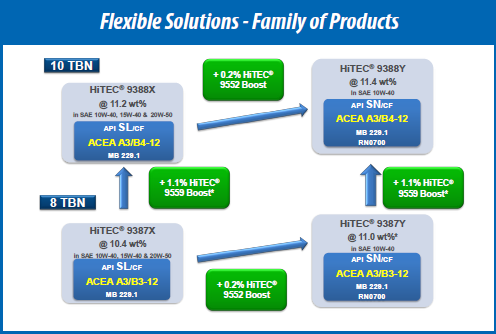Yeah sure, each detergent has pro's and con's, and the best way to decide it's use in the field is to do a VOA then use it then do a UOA. Repeat for the next oil formulation. some formulations have better TBN retention than other formulas, I don't think anybody will deny that. However, TBN is the usual first order metric to gauge how long an oil can last in the field. It's not perfect, but it's measured and tabulated for a reason.
Also from what I can tell, most big oil companies don't make their own add packs, they buy these from other companies like Lz or Afton, and then add them to their base oil at different rates. If the same add pack (or packs, sometimes a secondary booster pack is used) is used in multiple oils by a company and added to the same (or similar) base oil to produce a C3 oil, then more is added to make it an A3/B3 oil then more again for a A3/B4 oil. Then yes, the A3/B4 oil will have a higher TBN and should last longer in the field.
From Afton, additive HiTEC 9388X
[Afton Add Pack]
Quote:
Recommended Dosage
The recommended treat rates are as follows:
Either:
HiTEC® 9388X – ACEA A3/B4-10 @ 11.2%
Or:
HiTEC® 9387X – ACEA A3/B3-10 @ 10.4%
+ HiTEC® 9559 Booster @ 1.1%
For API SN or RN0700, add HiTEC® 9552 booster @ 0.2%
From the HiTEC 9387/88 series of additives
[Afton Link] , they use this diagram
They also talk about the logistical simplicity of only having a few additive packages to make all your oil products.
You said:
Originally Posted By: UltrafanUK
There is no real difference in how long a C3 or A3/B4 oil will last
And I respectfully disagree, especially if the oils come from the same manufacturer and are using the same add pack at a different dose rate, or the standard add with a booster add thrown on top.


